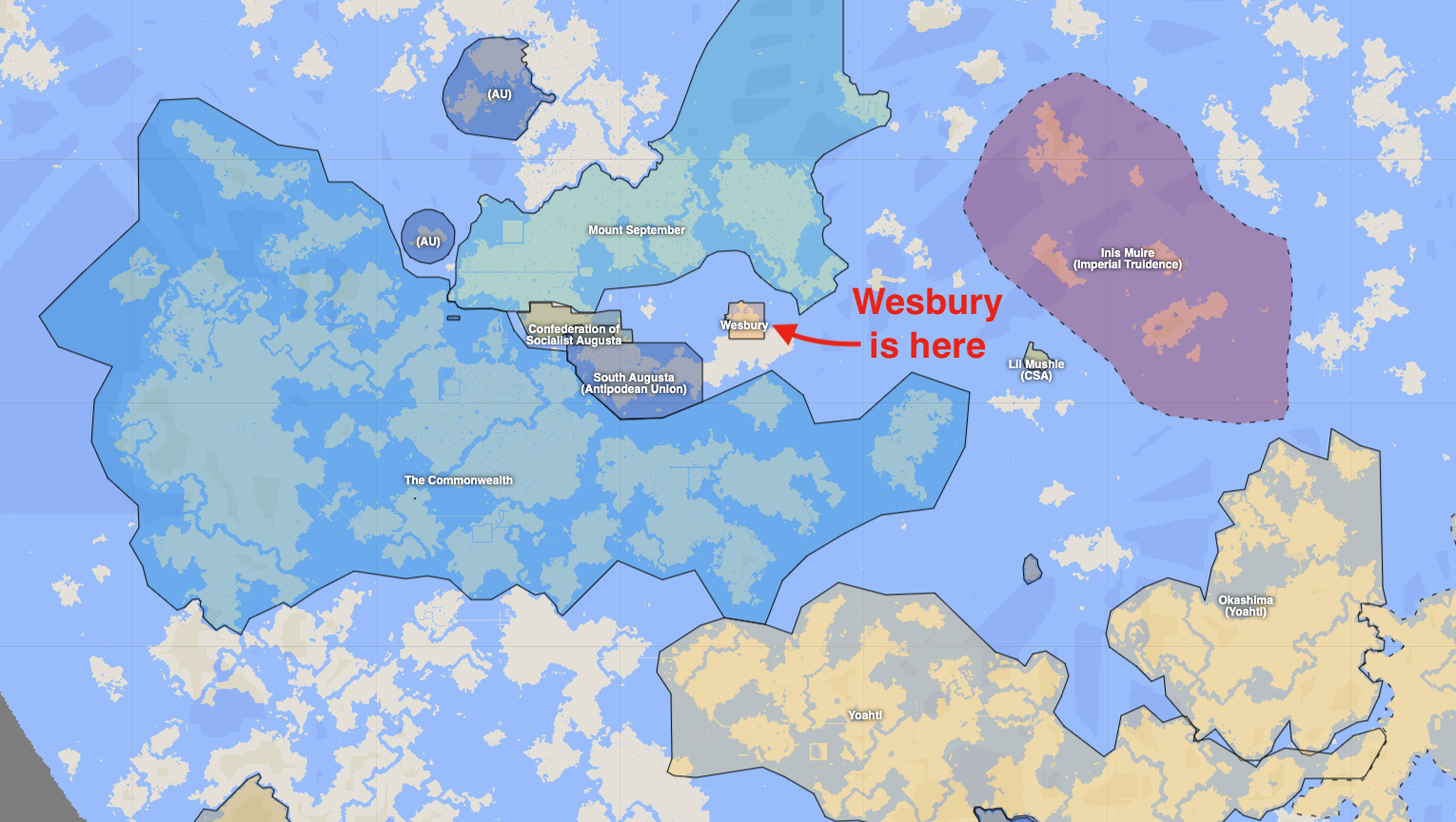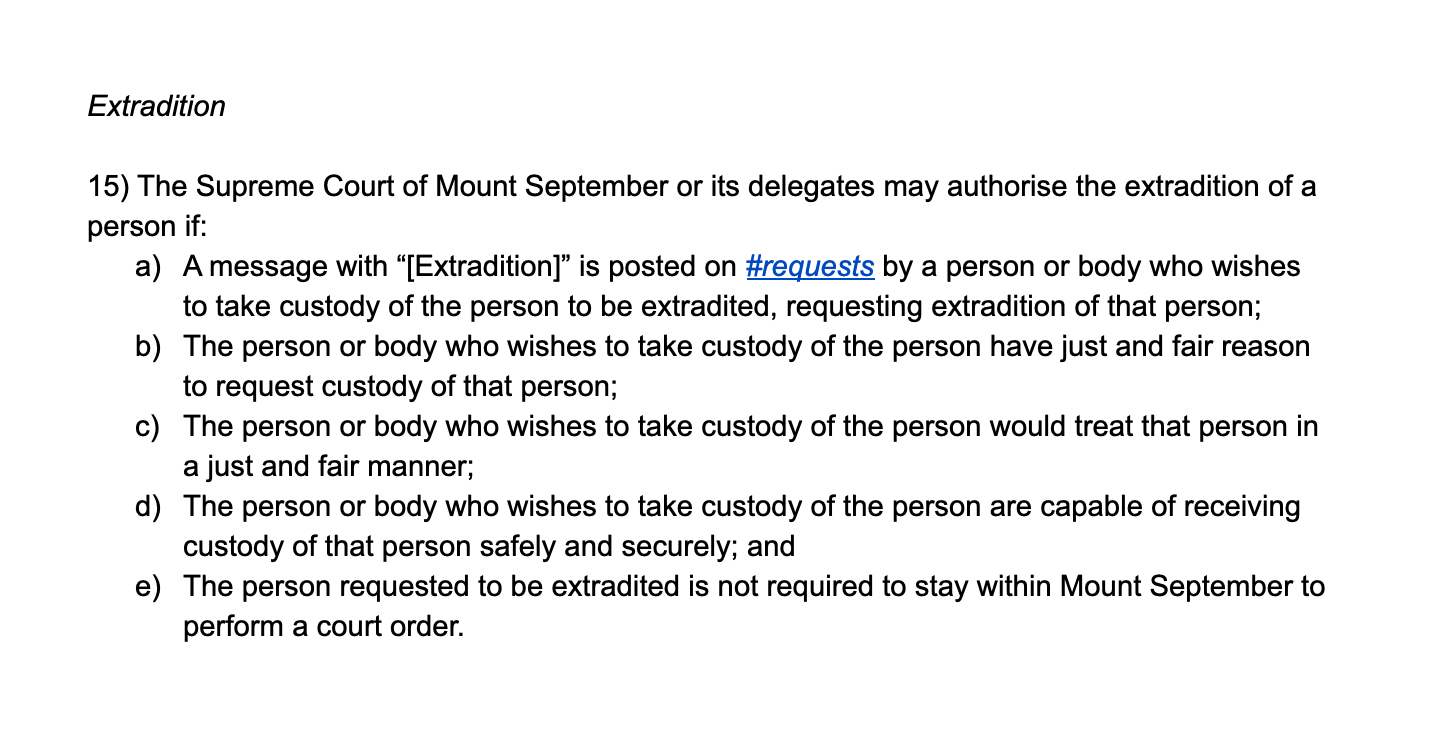Breakdown in Treaty Negotiations
title: Breakdown in Treaty Negotiations author: Lord Admiral Orinnari date: 2021-03-18 20:00 excerpt: Extradition treaty with Mount September fails before it gets off the ground.
Discussions of a treaty between Wesbury and Mount September began in earnest on 16th March 2021 when the Lord Admiral considered applying to join the Augustan Federation as a member of the Augustan Consortium. However, the Charter of the Augustan Federation lacked certain policies and arrangements, such as extradition, and suggested possibly resolving these issues with standalone treaties. Lodish then mentioned that the Commonwealth, known for its lax extradition policy, would be interested in such an extradition treaty, and so the Lord Admiral took the opportunity to spearhead what could turn out to be a multinational cooperative.
Since the Admiralty of Wesbury is such a tiny nation almost entirely surrounded by much larger and more established nations - that anyone can leave Wesbury's jurisdiction by walking in any direction for a handful of seconds - attempting to enforce Wesbury's laws necessarily requires having frictionless extradition policies with neighbouring states.

The fundamental premise of the extradition treaty was that signatories would refrain from claiming jurisdiction over captured persons if the claim of jurisdiction is based solely on location: that say for the sake of argument that someone committed a devastating raid on South Augusta and was pursued and captured within the borders of Wesbury, this treaty would ensure that Wesbury would not interfere or impose itself since the location of the capture was purely incidental and irrelevant to the charges arrayed against the suspect.
Given that such a premise only applies in rather narrow circumstances and that the full text of the treaty had yet to be negotiated, discussed, or even finished, it was surprising therefore when Allen, a respected member of the Septembrian community that had no relevant official role in the treaty negotiations nor seemingly any interest to have one, began arguing with and accosting the Lord Admiral, disparaging the treaty as fundamentally and irreconcilably incompatible with Mount September. Indeed, Allen had already expressed his objections (prior to any discussion of the fundamental premise) over to the intention to ratify the treaty as law rather than kept as a mere political promise, which is apparently incredibly problematic.

While the treaty would allow Wesbury to more reliably enforce its laws, it would also decrease the potential ire from powerful military factions which, considering the two world wars, could flatten Wesbury without difficulty or hesitation with the Lord Admiral potentially disappearing into a vault, so the treaty was in part the ratification of a procedure that's already expected of smaller, less militant states.
Some in Mount September suggested that such a treaty is unnecessary since aggrieved nations can simply submit an extradition request to the judiciary of Mount September, that Wesbury was in fact asking for special entitlement to randomly kidnap wholesome newfiends from Mount September and subject them to unfair treatment. The Lord Admiral obviously saw it differently, that Mount September's laws of extradition left a lot to be desired:
The Lord Admiral expressed practical concerns: that in a situation where Wesbury is devastated with grief for example and the perpetrator happens to be pearled slightly within the borders of Mount September, the last thing the Lord Admiral or really anyone would want to do is loiter on the fringes of Mount September's borders waiting and hoping for the Supreme Court to assemble and rule on the matter in a timely manner; that he'd prefer to return to Wesbury to repair the damage and respect the ruling when it comes; that there's no practical difference between the two in Mount September's ability to actually enforce the respect of the ruling thus the latter should be allowed out of respect. Additionally, there were concerns about the Supreme Court's ability to rule arbitrarily: that the law specifies ways in which the court may allow the extradition, but that the court could reject the request for any reason or even no reason at all, or subject different nations to entirely different definitions of just and fair. And lastly that the court seems to impose its will upon the pearl even after it leaves the territorial jurisdiction of Mount September: that aggrieved nations must adequately explain and have a game-plan imposed upon them about how the suspect will be brought to justice which if deviated from for any reason must be adequately justified to Mount September or otherwise face the consequences including but not limited to the prohibition of future extraditions. And all of this is because the suspect was, in the example, merely captured a few blocks inside Mount September's borders as defined on the ccmap. He considers this completely impractical if not outright disrespectful, especially since Mount September's first extradition request seemingly prevented the claimant from the chance to purchase a PS5, so the slow and bureaucratic institutions have already had tangibly negative effects on real people in their real lives on its first try.
That being said, while that extradition request had tangible real world consequences, it still happened relatively quickly since the request was made during American peak time hours. Whereas it's possible that, should the request be submitted during European, Asian, or Oceanic peak times that the request could potentially take hours, perhaps even close to a day depending on the day and activity level, all the while having to linger within Mount September's borders.

Any and all attempts at recourse and remedy for this involved submitting wholeheartedly to Mount September law in the eyes of Allen, there was no room for compromise or alternative solutions, particularly since Allen contests Wesbury's legitimacy as a nation state at all since the low population count makes it not adequately democratic in his opinion. The Lord Admiral attempted to satire these absolutist views, suggesting a perma-pearl sentence for crossing the border without a visa, threatening to tear up Mount September's rails that happen to pass through Wesbury's territory, threatening to pearl a Septembrian resident for "infringing on Wesbury's mineral rights", all the while playing up the ridiculousness by emphasising how arbitrary these decisions are because Wesbury is apparently just as arbitrary. Unfortunately however, Allen and other Septembrians were oblivious to or otherwise un-phased by this, considering it business as usual and just another exercise of sovereignty that's perfectly reasonable on civ.
The Lord Admiral realised that any attempt to negotiate this treaty would be in vain, particularly since the Septembrian diplomat resigned before treaty negotiations began, as well as there being no indication of the appointment of a new diplomat happening in a timely manner, as well as the indication that a dedicated diplomatic channel would not be created until a new diplomat is appointed, thus relegating important treaty negotiations to the court of public opinion before anything's decided upon. Thus the Admiralty of Wesbury has formally withdrawn from treaty negotiations with Mouth September since the Lord Admiral currently considers Mount September as an unreliable neighbour.
